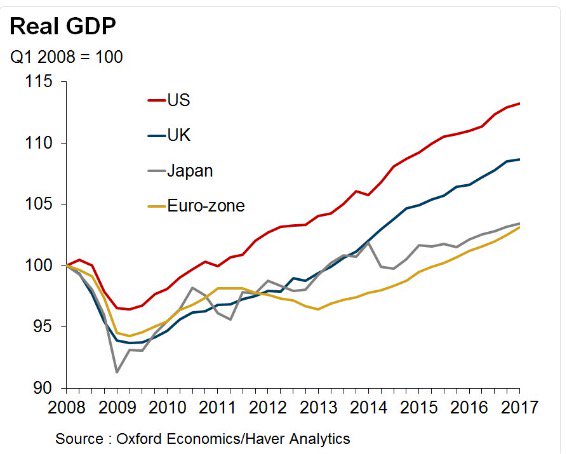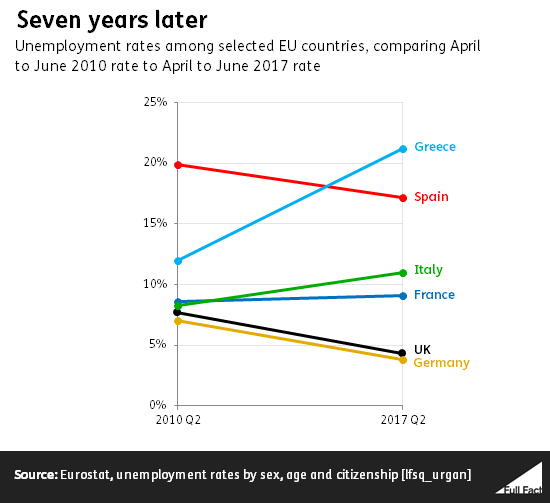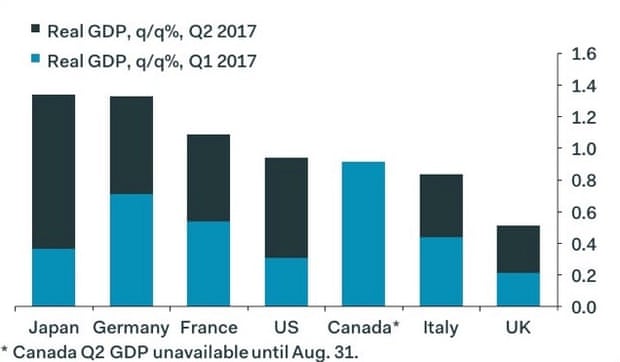- 20 Dec 2017 10:33
#14872859
If the UK wants anything resembling its current access to the single market, it will have to accept EU rules without having a say in making these rules. The Brexitters will have succeeded the incredible feat of turning their country from a "rule maker" into a "rule taker."
The loss isn't only economic. Britain's influence in the world has already suffered. Within a short period of time, it has already lost two UN votes because it can no longer count on the support of its EU partners.
Brexit will cause loss of influence on scale of 1970s, says ex-MI6 chief
Having pissed at the EU/EEC for over 40 years, nobody in Europe is going to shed any tears about the decline of GB.
hartmut wrote:This kind of staying in a "single market" would stand for the folly of simply staying without a voice, loud enough to be heard, in that very market.
If the UK wants anything resembling its current access to the single market, it will have to accept EU rules without having a say in making these rules. The Brexitters will have succeeded the incredible feat of turning their country from a "rule maker" into a "rule taker."
The loss isn't only economic. Britain's influence in the world has already suffered. Within a short period of time, it has already lost two UN votes because it can no longer count on the support of its EU partners.
Brexit will cause loss of influence on scale of 1970s, says ex-MI6 chief
Brexit is set to cause a loss of UK influence on a par with the 1970s, requiring a national assessment of how the UK’s future standing can be recovered once Brexit is complete, Sir John Sawers, the former head of MI6, has warned.
Speaking to the foreign affairs select committee, Sawers said: “We can see the trend of the coming years and we do not want to go through a repeat of the 1970s where the UK went progressively downhill compared to our national partners. We will need to turn it around. I am not sure how we are going to do it.”
Calling for an urgent reprioritisation of resources post-Brexit, he said: “We have to recognise a pretty stark reality faces us at the end of this process, and we have to rebuild from that.”
Accused by the Conservative MP Nusrat Ghani of providing only “gloom and doom” about Brexit, Sawers hit back, saying: “We have to acknowledge that Brexit is damaging our economy at the moment. Immediately after Brexit we suffered a 15% devaluation in our currency – we devalued all the assets in the UK by 15%. We are going through a Brexit inflation at the moment which means that people’s pay rises are not enough to keep up with real-terms incomes and, having 18 months ago been at the top of the G7 table of GDP growth performance, we are now at the bottom, so we are undoubtedly going through a bit of a dive. At the end of this process we will need to work out how to rebuild our economy and our influence in the world.”
He added: “For the last 25 years our foreign policy has been closely tied up with working closely with our international partners, especially France and Germany.” At the same time, he said, the US had become a less reliable partner, “making the international system less effective than in the past” .
He said Brexit meant the UK would suffer “a double loss” at the UN since it would not be able to shape the influential common EU policy in New York or be able to rely on EU support at the general assembly.
Sawers called for more funding for security services after Brexit, saying: “It will be vital that we sustain, in many ways enhance, our investments in diplomacy, defence, intelligence – very high investments are made already – if we want to have an influence in the world of the sort we have had over the last 30 or 40 years.”
Sawers was giving evidence about the UK’s failure to win a vote at the UN general assembly to secure a seat for the British candidate on the international court of justice (ICJ), even though the seat was normally seen as reserved for a member of the EU. The seat instead went to an Indian judge, possibly reflecting a loss of general authority for the five permanent members of the security council.
The defeat has been seen as a symbol of a wider loss of UK influence at the UN in the wake of Brexit.
Sawers, a former UK ambassador to the UN, said he was surprised by the British defeat, adding that the distraction of the UK political class by Brexit may have contributed. Referring to the prime minister, he said: “She is not able to play the same international role in the world as the French president has in the past six months. That is just a reality.”
Another former UK ambassador to the UN, Lord Hannay, said some had spotted the UK’s decline in influence like a shark spots blood in the water. He added: “The trepidation index, when people mind if they trample on our toes, has gone down.” He said it was vital campaigns to win elections such at the one for the ICJ were begun as long as a year before the poll started, adding that efforts by the foreign secretary, Boris Johnson, to win the poll had come too late.
He warned that in future automatic EU solidarity over issues such as the Falklands might not be forthcoming. The EU surprised Argentina by imposing sanctions following the Falklands invasion. Hannay said: “The EU solidarity issue is now in play and I am afraid we will lose it.”
Having pissed at the EU/EEC for over 40 years, nobody in Europe is going to shed any tears about the decline of GB.




















 - By Istanbuller
- By Istanbuller